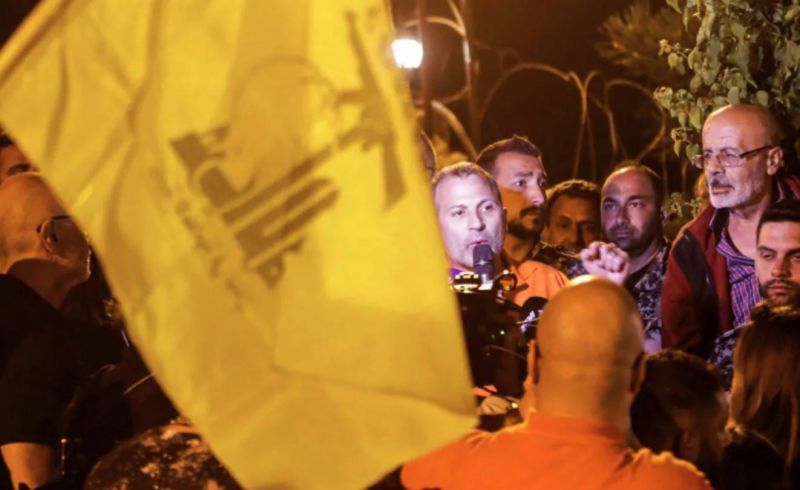
Gebran Bassil addresses his supporters on May 16, 2022, after the legislative elections. Next to him is a large Hezbollah flag. (Credit: Ibrahim Chalhoub/AFP)
In May 2022, the results of the parliamentary elections were likely satisfying for Hezbollah. Along with its ally the Amal Movement, the party obtained all 27 seats reserved for Shiite Muslims and helped its Christian partner, the Free Patriotic Movement (FPM), limit its losses despite popular discontent.
One year later, Hezbollah’s electoral strategy, which favored its Christian ally at the expense of other members of the March 8 camp, seems to have backfired.
In the midst of the presidential battle, the FPM has refused to support Hezbollah’s candidate, Marada movement leader Sleiman Frangieh, who has been left without the needed Christian legitimacy. FPM leader Gebran Bassil has even refused to ensure the quorum needed for an electoral session to take place. This comes despite the fact that Frangieh helped ensure the quorum needed to get Michel Aoun elected back in 2016.
Hezbollah to the rescue
“During the parliamentary elections, our two main objectives were to take all the Shiite seats and to allow the FPM to come first on the Christian scene,” a Hezbollah official told L’Orient-Le Jour. Following the elections, the FPM obtained 17 seats — a decline from the 30 seats it held in the previous elections. Meanwhile, FPM’s rival, the Lebanese Forces (LF), won 19 seats.
Gebran Bassil still claims to be number one among the Christian parties and says that the three Armenian MPs from Tachnag — a party allied to the FPM — should also be considered part of his bloc. Bassil's claim does not seem to hold however. “Our figures indicate that the FPM’s popularity in the Christian public opinion dropped by some 40 percent compared to 2018,” said electoral expert Assem Chaya.
During the 2019 popular uprising, Bassil was one of the primary targets of protesters. A few months after the uprising began, the Beirut port explosion devastated the capital, and Hezbollah was accused of being involved. The FPM's alliance with the party further hurt its popularity at the time.
“We did our best to support the FPM in the parliamentary elections, especially at the expense of our other allies,” said the same Hezbollah official. In Baalbeck-Hermel, Hassan Nasrallah’s party backed the candidacy of FPM member Samer al-Tom for the Greek-Catholic seat which is traditionally reserved for an individual affiliated with the Syrian Social Nationalist Party (SSNP), which did not win any seat. This was perceived by many analysts as a message to the Damascus regime, which wanted to take advantage of the elections to regain some of its influence in Lebanon.
In the Bekaa West district, former Deputy Parliament Speaker Elie Ferzli — who is pro-Assad — paid the price of this preferential treatment. Despite running for the Greek Orthodox seat on the March 8 camp list, he ranked fourth on the list he was running on. Ferzli came just behind FPM candidate Charbel Maroun and subsequently lost the seat.
‘Give and take’
Putting its resources and mobilization capacity to use, Hezbollah distributed votes to guarantee the victory of its favorites.
“This can be done in two ways,” said Chaya. “First, by giving a group of voters — a village or a neighborhood that is sympathizing to Hezbollah, for example — outright instructions to vote for a specific candidate. Second, during the vote counting process, Hezbollah’s election delegates tolerate the cancellation of ballots that give a preferential vote to a candidate considered a threat,” he added.
Rabih Haber, another electoral expert, expressed a nuanced opinion. “The alliance between the FPM and its Shiite ally in the last election was a give and take. Hezbollah helped the FPM in Baalbeck, and [the FPM] returned the favor in Jbeil. [Hezbollah]’s candidate would not have been elected without the FPM support,” he said.
He admitted however, that the alliance with Hezbollah allowed the FPM to win some seats, including the Protestant seat in Beirut II, which went to Edgard Traboulsi.
Ramzi Maalouf, the SSNP candidate for the Greek Orthodox seat in Beirut, was not elected, as he did not benefit from any transfer of votes from Hezbollah.
Thus, Hezbollah’s strategy has greatly benefited the FPM, allowing it to obtain a handful of additional seats. Today, Hassan Nasrallah is seeking Christian legitimacy for his preferred candidate. To have it, he needs the support of at least one of the two main blocs representing the Christian community. While the LF is categorically opposed to Frangieh’s candidacy, Hezbollah has not been able to convince Bassil to take on the role.
The animosity between the FPM and Marada is not new, especially since ad hominem attacks have been taking place between the two parties’ leaders for years.
However, many analysts believe that the FPM leader will eventually play the game for the sake of preserving his relationship with Hezbollah, especially since he owes much to his Shiite ally. For the moment, Bassil remains adamant.
“It is too early to talk about regrets,” said Kassem Kassir, an analyst close to Hezbollah. “We have to see how the presidential election will play out and what Gebran Bassil’s final decision will be in order to judge objectively. But what is certain is that Hezbollah has not yet abandoned the alliance with the FPM.”
This article was originally published in French in L'Orient-Le Jour. Translation by Joelle El Khoury.